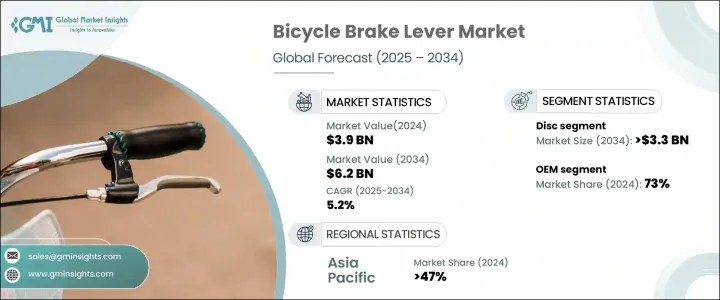
세계의 자전거 브레이크 레버 시장은 2024년에는 39억 달러로 평가 되었으며, 2025년부터 2034년까지의 CAGR은 5.2%를 나타낼 전망입니다. 자전거 부품, 특히 브레이크 레버에 대한 수요 급증은 주로 피트니스 및 레크리에이션 활동으로 사이클링을 채택하는 사람들이 증가함에 따라 발생합니다. 사람들이 건강에 대한 관심이 높아지고 대체 교통수단을 찾게 되면서 자전거는 접근성이 뛰어나고 다재다능하며 관절에 좋은 선택으로 떠오르고 있습니다. 도시 지역과 피트니스 애호가들 사이에서 인기가 높아지면서 자전거 브레이크 레버 시장은 레크리에이션 및 프로 사이클리스트의 요구를 모두 충족하기 위해 확장되고 있습니다.

자전거에 대한 수요는 환경 지속 가능성과 친환경 교통 솔루션에 대한 관심이 높아짐에 따라 더욱 강화되었습니다. 전 세계 정부와 지자체가 자전거 인프라에 투자하고 자전거의 장점을 홍보함에 따라 출퇴근, 운동, 레저를 위해 자전거로 전환하는 개인이 늘어나고 있습니다.
| 시장 범위 | |
|---|---|
| 시작 연도 | 2024년 |
| 예측 연도 | 2025-2034년 |
| 시작 금액 | 39억 달러 |
| 예측 금액 | 62억 달러 |
| CAGR | 5.2% |
시장은 브레이크 유형, 판매 채널 및 지역에 따라 세분화됩니다. 브레이크 유형별로 시장은 림, 디스크 및 드럼 브레이크로 나뉘며 디스크 브레이크 부문이 시장을 지배하고 있습니다. 습하거나 거친 지형과 같은 다양한 조건에서 탁월한 성능을 발휘하는 것으로 알려진 디스크 브레이크는 일관되고 강력한 제동력을 제공합니다.
판매 채널에 따라 시장은 OEM과 애프터마켓 부문으로 나뉩니다. OEM은 자전거 제조업체에 직접 브레이크 레버를 공급함으로써 사전 조립된 자전거에 부품을 원활하게 통합할 수 있도록 합니다. 특히 도시 자전거 및 통근 수요가 많은 지역에서 고품질 자전거를 비용 효율적으로 생산하는 데 필수적인 역할을 합니다.
지역별로는 아시아태평양이 2024년 시장 점유율의 47%를 차지했습니다. 이 지역은 탄탄한 제조 인프라, 경쟁력 있는 생산 비용, 고도로 효율적인 공급망 네트워크의 이점을 바탕으로 자전거 부품의 선도적인 허브로 자리매김하고 있습니다. 자전거를 지속 가능한 교통 수단으로 장려하는 정부 노력에 힘입어 번성하는 국내 자전거 시장은 이 지역에서 자전거 시장의 입지를 더욱 강화하고 있습니다. 도시화가 진행되고 중산층이 확대됨에 따라 아시아태평양 지역에서 자전거 및 부품에 대한 수요가 지속적으로 증가하여 글로벌 시장의 핵심 기업의 역할을 공고히 하고 있습니다.
자전거 브레이크 레버 시장은 지속적인 피트니스 혁명, 도시 교통 수요, 제동 기술의 발전 등 여러 요인에 의해 주도되고 있습니다. 제조업체들은 자전거 커뮤니티를 위해 더 나은 성능의 친환경적이고 비용 효율적인 솔루션을 제공하기 위해 끊임없이 혁신하고 있습니다. 사이클링 경험을 향상시키는 데 지속적으로 초점을 맞추면서 브레이크 레버와 같은 고품질 자전거 부품에 대한 전 세계 수요는 향후 10년간 상승세를 유지할 것으로 예상됩니다.
The Global Bicycle Brake Lever Market, valued at USD 3.9 billion in 2024, is poised for steady growth, with a projected CAGR of 5.2% from 2025 to 2034. The surge in demand for bicycle components, especially brake levers, is largely driven by the increasing adoption of cycling as a fitness and recreational activity. As people become more health-conscious and seek alternative modes of transportation, cycling has emerged as an accessible, versatile, and joint-friendly choice. With its growing popularity in urban areas and among fitness enthusiasts, the market for bicycle brake levers is expanding to meet the needs of both recreational and professional cyclists.

The demand for bicycles has been further bolstered by the rising focus on environmental sustainability and eco-friendly transportation solutions. As governments and municipalities around the world invest in cycling infrastructure and promote the benefits of cycling, more individuals are making the switch to bicycles for commuting, exercise, and leisure. This trend, combined with the growing emphasis on fitness and healthy lifestyles, presents significant opportunities for the global bicycle brake lever market.
| Market Scope | |
|---|---|
| Start Year | 2024 |
| Forecast Year | 2025-2034 |
| Start Value | $3.9 Billion |
| Forecast Value | $6.2 Billion |
| CAGR | 5.2% |
The market is segmented based on brake type, sales channel, and region. By brake type, the market is divided into rim, disc, and drum brakes, with the disc brake segment dominating the market. In 2024, disc brakes held a commanding 50% share and are expected to generate USD 3.3 billion by 2034. Known for their exceptional performance in various conditions, such as wet or rugged terrains, disc brakes provide consistent and powerful stopping capability. This makes them the preferred choice for both high-performance bicycles and recreational riders, driving their demand globally.
Sales channels further divide the market into OEM and aftermarket segments. OEMs played a crucial role in 2024, capturing 73% of the market share. By supplying brake levers directly to bicycle manufacturers, OEMs ensure the seamless integration of components into pre-assembled bicycles. Their role is integral to the cost-effective production of high-quality bikes, especially in regions with high demand for urban cycling and commuting.
In terms of geographical dominance, the Asia Pacific region accounted for 47% of the market share in 2024. The region benefits from a robust manufacturing infrastructure, competitive production costs, and a highly efficient supply chain network, positioning it as a leading hub for bicycle components. The thriving domestic market for bicycles, supported by government initiatives promoting cycling as a sustainable form of transportation, further strengthens the market's position in the region. With increasing urbanization and an expanding middle class, demand for bicycles and their components continues to rise in Asia Pacific, cementing its role as a key player in the global market.
The bicycle brake lever market is driven by several factors, including the ongoing fitness revolution, urban transportation needs, and advancements in braking technologies. Manufacturers are continually innovating to offer better-performing, eco-friendly, and cost-effective solutions for the cycling community. With a continued focus on enhancing the cycling experience, the global demand for high-quality bicycle components, such as brake levers, is expected to maintain its upward trajectory over the next decade.